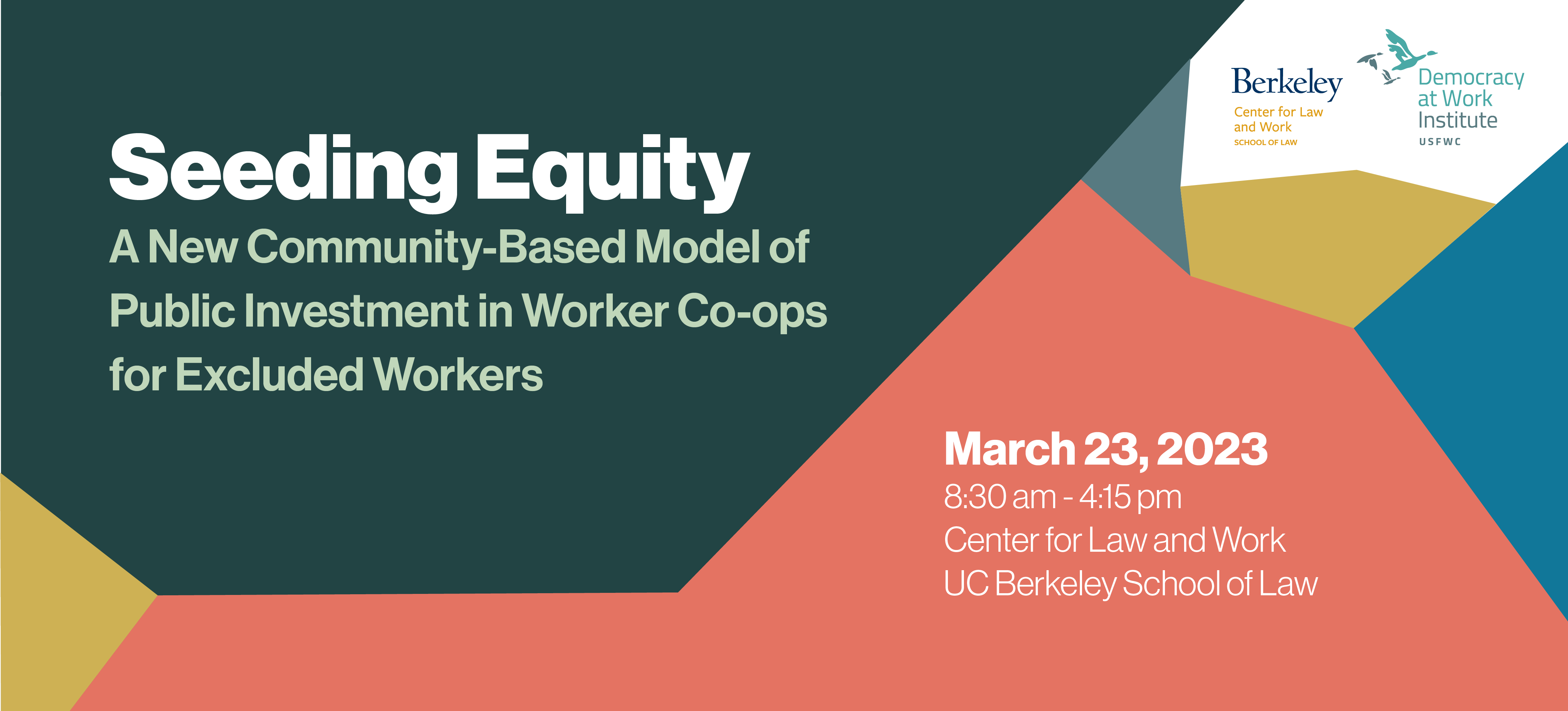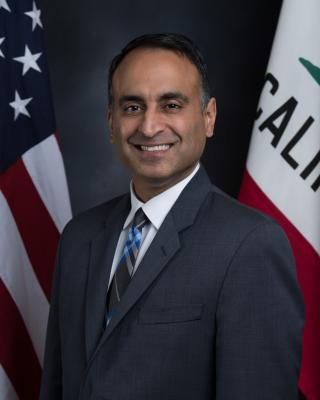A New Community-Based Model of Public Investment in Worker Co-ops for Excluded Workers
Thu, March 23, 2023 | 8:30 AM – 4:15 PM PDT
Pauley Ballroom 2495 Bancroft Way Berkeley, CA 94720

This special event was made possible through the generous support of The James Irvine Foundation.
Interpretation services were graciously provided by Weingart Foundation.
Keynote Speakers

California State Assemblymember
Ash Kalra
Chair of the California Legislative Progressive Caucus, and Chair of the Committee on Labor & Employment

Betty Hung
Senior Advisor
Office of the Deputy Secretary U.S. Department of Labor
Panelists
- Vanessa Bransburg
Co-Executive Director for Operations & Programs, Democracy at Work Institute - Christina Chung
Executive Director, Center for Law and Work, UC Berkeley School of Law - Luis Diaz
Worker-Owner, CLEANWash Mobile - Glen Eagleson
Principal Workforce Policy Analyst, San Francisco Office of Economic & Workforce Development - Catherine Fisk
Barbara Nachtrieb Armstrong Distinguished Professor of Law,
Faculty Director, Center for Law and Work, UC Berkeley School of Law - Juan Hernandez
Worker-Owner, CLEANWash Mobile - Melissa Hoover
Co-Executive Director for Partnerships & Growth, Democracy at Work Institute - Reg Javier
Executive Director, California Employment Training Panel - Zulma Maciel
Director, Office of Racial Equity City of San José - Anh-Thu Nguyen
Director of Strategic Partnerships, Democracy at Work Institute - Leslie Payne
Initiative Director, The James Irvine Foundation - Iliana Perez
Director of Research & Entrepreneurship, Immigrants Rising - Tonatiuh Ramos
Worker-Owner, Radiate Bay Area Cooperative - Aquilina Versoza Soriano
Executive Director, Pilipino Workers Center of Southern California - Zen Trenholm
Senior Director of Employee Ownership Cities & Policy, Democracy at Work Institute - Ana Siria Urzúa
Director, Cooperacion Santa Ana - Laura Valdez
Executive Director, Dolores Street Community Services
Agenda
| 8:30 – 9:15 am | Registration & Breakfast |
| 9:15 – 10:00 am |
IntroductionWelcome:
Introduction:
Description: The symposium will open with an overview of California SEED (Social Entrepreneurs for Economic Development), an innovative state grant program promoting socially responsible business ownership opportunities for workers who are excluded, due to their limited English proficiency or immigration status, from gainful employment. Having envisioned and launched SEED when she was Senior Advisor of Law and Policy at the California labor agency, Ms. Chung will frame the day’s discussion by providing insights into why and how SEED was created, and spotlight the key components of SEED’s community-based worker cooperative model. |
| 10:00 – 11:30 am |
Panel 1 | Growing from SEED: The California Worker Owner CollaborativeModerator:
Speakers:
Description: In 2021, California launched SEED, a state grant program that funded an impressive model partnership between community-based organizations (CBOs) in California that organize excluded workers in low-wage industries, and national experts in worker co-op development. Through SEED, this partnership incubated and formed worker co-ops in the car wash, child care, taxi cab, and homecare industries. Showcasing the CBOs that spearheaded the co-op projects, and the worker-owners who now lead them as part of the California Worker Owner Collaborative, this panel will discuss their successes, challenges, and lessons learned – and ultimately, demonstrate the tremendous potential of this model as an equitable workforce development strategy that empowers workers and raises labor standards. |
| 11:30 – 11:45 am | Break |
| 11:45 – 1:00 pm |
Panel 2 | Seeding Replication: Utilizing the Rapid Response Cooperative ModelModerator:
Speakers:
Description: Worker cooperative business incubation and formation can be a long and complex process, especially when aiming to center the needs and interests of excluded and historically marginalized workers. This panel highlights the Rapid Response Cooperative (RRC) model and toolkit developed by the Democracy at Work Institute, a key component of the worker co-op projects funded through California SEED. The RRC model standardizes elements of cooperative decision-making and high-road workplace practices to help cooperatives launch more quickly and at scale. Panelists will explore how the RRC model is now being replicated beyond California SEED as part of local workforce development initiatives in California and nationally to open up meaningful economic opportunities for excluded workers. Discussion topics will include challenges and insights for scaling co-op development and maximizing impact on targeted communities and industries. |
| 1:00 – 1:45 pm | Lunch |
| 1:45 – 2:30 pm |
Keynote: In DialogueSpeakers:
Description: These distinguished speakers will share their unique perspectives from the top levels of state and federal government, where they have advanced and supported innovative economic justice policies for our most vulnerable workers. They will discuss the critical role that the public sector plays in fostering equitable workforce development strategies and initiatives, including California SEED and beyond. |
| 2:30 – 2:45 pm | Break |
| 2:45 – 4:00 pm |
Panel 3 | Seeding Investment: Increasing Public and Private Sector Development of Worker Co-ops for Excluded WorkersModerator:
Speakers:
Description: How can we build on the innovative worker cooperative model funded under California SEED, in order to further expand worker ownership for communities locked out of good jobs and other workforce opportunities? Panelists from state and local government and philanthropy will share insights on how to make the case within the public and private sectors to invest in worker co-ops for excluded workers, as essential to an equitable workforce development strategy; and how stakeholders can and should work creatively together to support the growth of SEED’s community-based model of worker co-op development, in synergy with the larger movement of economic justice for excluded workers. |
| 4:00 – 4:15 pm |
Closing RemarksSpeakers:
|